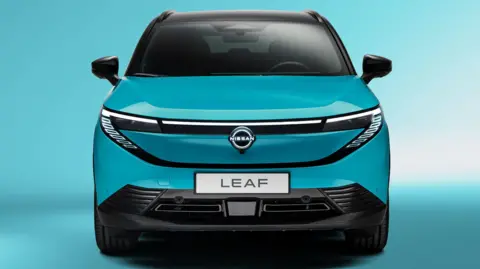Nissan, the renowned automobile manufacturer, has officially unveiled plans for its new third-generation electric vehicle, the Leaf, which is set to be manufactured at the company’s Sunderland factory in the United Kingdom. This announcement marks a significant step forward for the company and for the electric vehicle (EV) industry at large, showcasing Nissan’s commitment to electric mobility and sustainable manufacturing practices.
The production of the Nissan Leaf will be executed by a skilled workforce of approximately 6,000 employees at the Sunderland plant. This location has become particularly notable within the automotive sector for its advanced manufacturing capabilities and its role in the UK economy. The new Leaf will offer an impressive range of up to 375 miles (or 604 kilometers) on a single charge, making it a competitive option in the growing electric vehicle market.
One of the noteworthy aspects of the Leaf’s production is its sustainability focus. The vehicle will be powered by batteries supplied by AESC UK, a subsidiary of Nissan’s battery partner, which operates adjacent to the Sunderland manufacturing facility. This co-location is anticipated to enhance efficiency and reduce the carbon footprint associated with transportation logistics for battery supply.
In addition to producing the Leaf, the Sunderland site is already responsible for assembling other popular Nissan models, such as the Juke and Qashqai. Alan Johnson, who is the senior vice president of manufacturing and supply chain management at Nissan Motor Manufacturing, expressed immense pride in unveiling the latest iteration of the Leaf. Johnson emphasized the significance of bringing electric vehicle and battery manufacturing to the UK over a decade ago, recognizing the expertise of the Sunderland team in integrating advanced technology and innovative design into mass production.
James Taylor, managing director of Nissan GB, highlighted that the Leaf has played a crucial role in encouraging thousands of consumers to transition towards electric motoring. Taylor also noted that this latest model signifies Nissan’s ongoing commitment to manufacturing within Britain, reaffirming its dedication to the economic and industrial landscape of the UK.
Furthermore, the introduction of the new Leaf is part of Nissan’s broader strategy, aligned with its EV36Zero project, which prioritizes sustainability throughout the manufacturing process. The initiative aims to foster a fully electric ecosystem from production to end-of-life vehicle management. Earlier in 2023, Nissan secured a substantial investment of £1 billion for an additional AESC UK electric car battery plant, indicating ongoing growth and expansion in the electric vehicle sector.
As Nissan embarks on this exciting new chapter with the Leaf, the automotive industry watches closely, taking note of the company’s commitment to innovation and sustainability. The new model is set to become available for orders later this year, allowing consumers passionate about environmental consciousness and electric mobility the chance to experience Nissan’s latest technological advancements.
Through the lens of this announcement, one can see the intersections of modern automotive engineering and environmental responsibility, as Nissan seeks not only to enhance its product offerings but also to reinforce its role as a leader in the electric vehicle market. The combination of cutting-edge technology, a dedicated workforce, and strategic sustainability efforts positions the Nissan Leaf as a pivotal player in the transition to a more sustainable transportation future.
As Nissan continues to innovate in the electric vehicle space, the company is also likely to influence trends in the automotive market, setting new standards in both performance and environmental responsibility. As they bring the new Leaf to market, the anticipation will build around how consumers respond to this latest offering and how it will shape the future of Nissan in an increasingly electric-oriented world.



